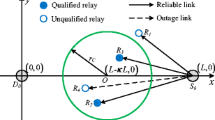Abstract
Cooperative ARQ networks enhance network throughput utilizing cooperative diversity at the data link layer where relays help communicating nodes during ARQ retransmissions. When network operates in ad hoc sense, the channel accesses are not coordinated and retransmissions occur randomly. In this case, cooperation of the relays may cause collisions at the retransmission phase and network throughput may be degraded. From this point of view, a cooperative diversity-multiple access trade-off problem rises. In this paper, an analytical framework is proposed for the solution to this problem, and the performance of cooperative ARQ is compared with traditional ARQ with no cooperation in terms of network performance parameters such as average throughput, average delay and packet loss under realistic channel settings.






Similar content being viewed by others
References
Sendonaris, A., Erkip, E., & Aazhang, B. (2003). User cooperation diversity-part I: System description. IEEE Transaction on Communication, 51(11), 1927.
Laneman, J. N., Tse, D. N. C., & Wornell, G. W. (2004). Cooperative diversity in wireless networks: Efficient protocols and outage behavior. IEEE Transactions on Information Theory, 50(12), 3062.
Zhao, B., & Valenti, M. C. (2005). Practical relay networks: A generalization of hybrid-ARQ. IEEE Journal on Selected Areas in Communications, 23(1), 7.
Dianati, M., Ling, X., Naik, K., & Shen, X. (2006). A node-cooperative ARQ scheme for wireless ad hoc networks. IEEE Transactions on Vehicular Technology, 55(3), 1032.
Stanojev, I., Simeone, O., Bar-Ness, Y., & You, C. (2006). Performance of multi-relay collaborative hybrid-ARQ protocols over fading channels. IEEE Communications Letters, 10(7), 522.
Alonso-Zarate, J., Kartsakli, E., Verikoukis, C., & Alonso, L. (2008). Persistent RCSMA: A MAC protocol for a distributed cooperative ARQ scheme in wireless networks. EURASIP Journal on Advances in Signal Processing 2008. Article ID 817401
Munari, A., Rossetto, F., & Zorzi, M. (2009). Phoenix: Making cooperation more efficient through network coding in wireless networks. IEEE Transactions on Wireless Communications, 8(10), 5248.
Zhai, C., Zhang, W., & Mao, G. (2012). Uncoordinated cooperative communications with spatially random relays. IEEE Transactions on Wireless Communications, 11(9), 3126.
Tse, D., & Viswanath, P. (2005). Fundamentals of wireless communication. New York: Cambridge University Press.
Gilbert, E. N. (1960). Capacity of a burst-noise channel. Bell System Technical Journal, 39, 1253.
Elliot, E. O. (1963). Estimates of error rates for codes on burst-noise channels. Bell System Technical Journal, 42, 1977.
Zorzi, M., Rao, R. R., & Milstein, L. B. (1997). ARQ error control for fading mobile radio channels. IEEE Transactions on Vehicular Technology, 46(2), 445.
Author information
Authors and Affiliations
Corresponding author
Additional information
Publisher's Note
Springer Nature remains neutral with regard to jurisdictional claims in published maps and institutional affiliations.
Rights and permissions
About this article
Cite this article
Tutgun, R., Aktas, E. A Markovian Analysis of Cooperative ARQ with Random Access. Wireless Pers Commun 123, 3201–3211 (2022). https://doi.org/10.1007/s11277-021-09282-6
Accepted:
Published:
Issue Date:
DOI: https://doi.org/10.1007/s11277-021-09282-6




